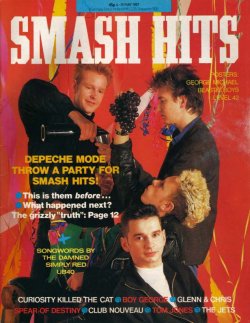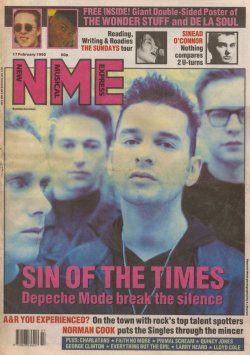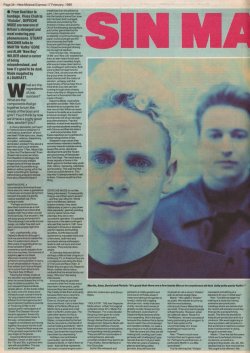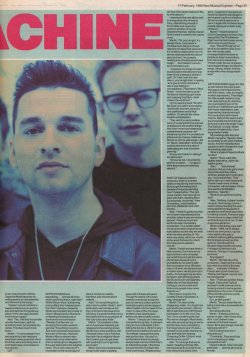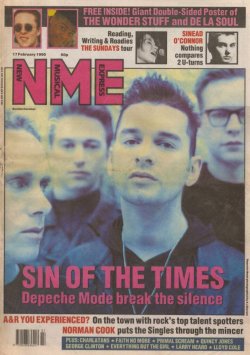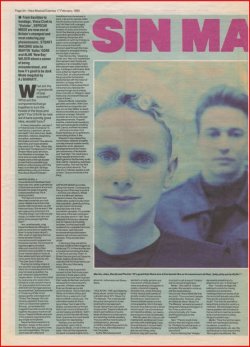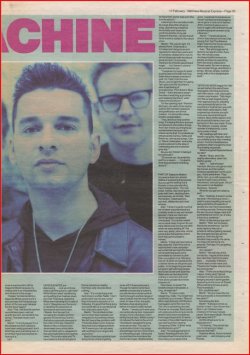You are using an out of date browser. It may not display this or other websites correctly.
You should upgrade or use an alternative browser.
You should upgrade or use an alternative browser.
Depeche Mode Sin Machine (NME, 1990)
- Thread starter demoderus
- Start date
-
- Tags
- 1990 nme sin machine
" As the ’80s wheezed and panted to a mildly geriatric end... charts full of ageing divorcee rock, rankly insincere charity records and a series of ghastly novelty House records, the awkward, outré charm of Depeche Mode became all the more appealing. Not in the least because they believe that a dance record needn’t be a formularised and repetitive dribble, nor need a pop song be a mush of platitudes. "
A fascinating piece which manages to remain lively and fluid while being considerably in-depth, giving a resume of the band's development and the popular view of them before running into an interview with Alan and Martin. The author has an almost poetic enthusiasm for the band which carries the piece along beautifully, and his gentle manner has the rare gift of opening up Martin, who gives some of his most revealing comments here. Delightful.
From Basildon to bondage, Vince Clarke to “Violator”, Depeche Mode are now one of Britain’s strongest and most enduring pop phenomena. Stuart Maconie talks to Martin “Kafka” Gore and Alan “New Boy” Wilder about a career of being misunderstood, and how it’s good to be dark. Mode mugshot by A J Barratt.
What are the ingredients of pop success? What are the components that go together to turn the heads of the boys and girls. You’d think by now we’d have a pretty good idea, wouldn’t you?
A cheery disposition, perhaps? A Fotolove view of romance? A cute haircut, a pert bum, all your own teeth? How about sex, death, alienation, violence, blasphemy, corruption, submission, domination and lies? How about a band who aren’t sure whether they want to be T-Rex, Nitzer Ebb or Dion And The Belmonts? From Smash Hits to sonic terrorism, from Basildon to bondage, the most anonymously brilliant singles band of the last decade proved that it is possible to go pop platinum without going soft in the head, to be little girls’ darlings without being a big girl’s blouse. How about Depeche Mode?
Martin Gore, a misunderstood individual if ever there was one, takes a genteel sip of Guinness and peers at me from beneath the peak of a goofily outsize baseball cap. He is smiling broadly.
“Perhaps we should have described ourselves as a rock group. Maybe if we’d done that people might have taken us a bit more seriously. But we aren’t. We are a pop group and proud of it. The only songs I can write are pop songs, no matter how dark and pervy some people might find them.”
I am, unashamedly, a big Depeche Mode fan although it took me some time to realise this. Now I’m quite brazen about it. After years of regarding them as those amiable if hardly momentous synth-poppers from the home counties, the moment of epiphany came one bleak afternoon round at my then-girlfriend’s boring brother-in-law’s, a man whose tastes in music at their wildest and most unhinged ran to some Rush albums and “The Dark Side Of The Moon”.
Fearing the holiday snaps at any second I was quite pleased when he moved toward the hi-fi to play his latest acquisition, the just-released Depeche Mode singles album. As the tracks rolled by, every one a hit, every one a miniature crash course in how to “do” pop properly and every one different from the ingenuous but accomplished Casiotone juvenile of “Dreaming Of Me” to the opaque gothic extravagance of “Shake The Disease” the truth became apparent. It was only when you heard their career in this way, compressed into nuggets of excellence and strung together like pearls the truth hit you: Depeche Mode were one of the greatest exponents of the pop single on the planet. [1]
Depeche Mode were born in Basildon, Essex on the cusp of the ‘70s and ‘80s, a glorious time ripe with possibilities. The pop world was still ruffled and breathless from the advent of punk. Like a prim spinster fallen into the hands of some Don Juan, pop had been both outraged, seduced and excited by this invasion of colour and anarchy. Out of this liberating atmosphere, and further galvanised by the increasing cheapness and availability of synth technology (a paper round could get you the kind of sounds that Keith Emerson paid through the nose for) Depeche emerged blinking into the light of stardom.
Their first two hits, “Dreaming Of Me” and “New Life” established them as teen heart-throbs and peddlers of an irresistibly bright, effervescent wipe-clean technopop, bubblegum with brains. Both were written by head honcho Vince Clarke, an odd cove who left the group when he became disenchanted with the notion of stardom, unhappy with the superficiality of fame (bear this in mind when you next see him running through some cheesy three note ditty on Wogan in stack heels and a fluorescent lilac suit made of tinsel).
[1] - This quote appears in the Steve Malins biography which, just to keep things in perspective, also quotes another (contemporary) review of the album: "A savage indictment of the British record-buying public, who've shelled out for this naff tat". It's as Andy said to a US interviewer in 1988: "Pop music is always hated at its time and always appreciated later on, and hopefully that'll be our legacy."
Last edited:
Depeche Mode, meanwhile, got better and better. With Gore established as songwriter and new recruit Alan Wilder an asset thanks to his skills as a musician / producer / arranger, the band evolved into one of our stronger pop phenomena. Populist weirdos, a band loved equally by both earnest students wrestling with Camus and their kid sisters… and everyone else, from Essex beerboys to my girlfriend’s enervating brother in law.
Steeped in pop values they nevertheless retained a healthy curiosity towards outside events, toward the remix, electronic developments and the Teuton percussiveness of Neubaten and Test Dept. The result was a music equally at home in the Berlin garret or the Barnsley youth club: catchy, menacing, seamless and brooding. This was the Nick Cave you could dance to. This was why I’d always wanted to talk to them. Chance would be a fine thing.
Depeche Mode do not like being interviewed. Consequently they go out of their way to avoid it – and they can afford to. Whilst not in the Michael Jackson bracket (indeed, they seem deliberately at pains to play down their popularity, gleefully pointing out any career worst chart placings) they are a very successful operation. It’s possible that some of the teen contingent who wet their pants in 1981 have defected to Erasure or deserted pop for nappies and building societies, but the band is still sustained by a sizeable hard core of devotees, both here and worldwide whose enthusiasm leads to sell-out tours and chart success. They are pop stars, alright.
In Germany they are still the little darlings (a little to their chagrin) of kiddie pop TV, in America they are a prosperous cult along the lines of The Cure and New Order. In Britain they are good old Depeche Mode, leather-skirted disco oddballs that the whole family can enjoy. Who don’t like being interviewed.
In the end they do give their consent to their first music press interview in three years, partly because they have been assured that I really do like them and partly because they have a record to promote, of which more later. Even so, the set-up is a tad unconventional. I am to meet Alan Wilder at the Mute offices and Martin Gore a week and a half later in a North London pub. The ostensible reason for this is Gore’s New Year break in the States, compounded to the fact that he returned to a flat bereft of central heating and Martin “didn’t want to do the interview till it was fixed. I just knew the mood would have been too depressing.”
Holidays over and boilers overhauled, I got to talk to Depeche Mode, or half of them at least – that half that represents the band’s musical engine room – about sin, subversion and Simon Bates.
“Violator”, the new Depeche Mode album, is their first original collection since ’87’s “Music For The Masses”. For a new decade the group have gone for a new sound and a new approach, though diehard fans will not be disappointed. Depeche Mode still deal in giant edifices of sound, bleak architectural constructions and sparkling melodic jewellery. They are still the most lovable of schizophrenics, eternally uncertain whether they want to be Franz Kafka, Steve Martland or Hot Chocolate.
As the ’80s wheezed and panted to a mildly geriatric end (one bunch of Roses doesn’t mean everything in the garden is lovely), charts full of ageing divorcee rock, rankly insincere charity records and a series of ghastly novelty House records, the awkward, outré charm of Depeche Mode became all the more appealing. Not in the least because they believe that a dance record needn’t be a formularised and repetitive dribble, nor need a pop song be a mush of platitudes.
After ten years at it, they are still making bold, exciting (can I even get away with challenging?) pop records that don’t rot your teeth. And after ten years of sidelong glances and being called perverts, they still have the chutzpah to call a record “Violator” with an almost straight face.
Martin: “We called it ‘Violator’ as a joke. We wanted to come up with the most extreme, ridiculously Heavy Metal title that we could. I’ll be surprised if people will get the joke. However, when we called an album ‘Music For The Masses’, we were accused of being patronising and arrogant. In fact it was a joke on the uncommerciality of it. It was anything but music for the masses!”
Alan: “There’s much more humour than we’re given credit for. Perhaps it’s just that ours, or particularly Martin’s is a little specialised.”
You’re claiming that “Violator” represents something of a departure for you. In what way?
Alan: “Usually we begin the making of a record by having extensive pre-production meetings where we decide what the record will actually sound like, then go into a programming studio. This time we decided to keep all pre-production to a minimum. We were beginning to have a problem with boredom in that we all felt we’d reached a certain level of achievement in doing things in a certain way.”
Martin: “Over the last five years I think we’d perfected a formula: my demos, a month in a programming studio, etc, etc. We decided that our first record of the ’90s ought to be different. We knew it was bound to still be Depeche Mode because my writing style is so characteristic and inherent to the songs.”
“Violator” is most certainly a Depeche Mode record and it’s also perhaps the first great pop album of the new year / decade. Are the boys happy?
Steeped in pop values they nevertheless retained a healthy curiosity towards outside events, toward the remix, electronic developments and the Teuton percussiveness of Neubaten and Test Dept. The result was a music equally at home in the Berlin garret or the Barnsley youth club: catchy, menacing, seamless and brooding. This was the Nick Cave you could dance to. This was why I’d always wanted to talk to them. Chance would be a fine thing.
Depeche Mode do not like being interviewed. Consequently they go out of their way to avoid it – and they can afford to. Whilst not in the Michael Jackson bracket (indeed, they seem deliberately at pains to play down their popularity, gleefully pointing out any career worst chart placings) they are a very successful operation. It’s possible that some of the teen contingent who wet their pants in 1981 have defected to Erasure or deserted pop for nappies and building societies, but the band is still sustained by a sizeable hard core of devotees, both here and worldwide whose enthusiasm leads to sell-out tours and chart success. They are pop stars, alright.
In Germany they are still the little darlings (a little to their chagrin) of kiddie pop TV, in America they are a prosperous cult along the lines of The Cure and New Order. In Britain they are good old Depeche Mode, leather-skirted disco oddballs that the whole family can enjoy. Who don’t like being interviewed.
In the end they do give their consent to their first music press interview in three years, partly because they have been assured that I really do like them and partly because they have a record to promote, of which more later. Even so, the set-up is a tad unconventional. I am to meet Alan Wilder at the Mute offices and Martin Gore a week and a half later in a North London pub. The ostensible reason for this is Gore’s New Year break in the States, compounded to the fact that he returned to a flat bereft of central heating and Martin “didn’t want to do the interview till it was fixed. I just knew the mood would have been too depressing.”
Holidays over and boilers overhauled, I got to talk to Depeche Mode, or half of them at least – that half that represents the band’s musical engine room – about sin, subversion and Simon Bates.
“Violator”, the new Depeche Mode album, is their first original collection since ’87’s “Music For The Masses”. For a new decade the group have gone for a new sound and a new approach, though diehard fans will not be disappointed. Depeche Mode still deal in giant edifices of sound, bleak architectural constructions and sparkling melodic jewellery. They are still the most lovable of schizophrenics, eternally uncertain whether they want to be Franz Kafka, Steve Martland or Hot Chocolate.
As the ’80s wheezed and panted to a mildly geriatric end (one bunch of Roses doesn’t mean everything in the garden is lovely), charts full of ageing divorcee rock, rankly insincere charity records and a series of ghastly novelty House records, the awkward, outré charm of Depeche Mode became all the more appealing. Not in the least because they believe that a dance record needn’t be a formularised and repetitive dribble, nor need a pop song be a mush of platitudes.
After ten years at it, they are still making bold, exciting (can I even get away with challenging?) pop records that don’t rot your teeth. And after ten years of sidelong glances and being called perverts, they still have the chutzpah to call a record “Violator” with an almost straight face.
Martin: “We called it ‘Violator’ as a joke. We wanted to come up with the most extreme, ridiculously Heavy Metal title that we could. I’ll be surprised if people will get the joke. However, when we called an album ‘Music For The Masses’, we were accused of being patronising and arrogant. In fact it was a joke on the uncommerciality of it. It was anything but music for the masses!”
Alan: “There’s much more humour than we’re given credit for. Perhaps it’s just that ours, or particularly Martin’s is a little specialised.”
You’re claiming that “Violator” represents something of a departure for you. In what way?
Alan: “Usually we begin the making of a record by having extensive pre-production meetings where we decide what the record will actually sound like, then go into a programming studio. This time we decided to keep all pre-production to a minimum. We were beginning to have a problem with boredom in that we all felt we’d reached a certain level of achievement in doing things in a certain way.”
Martin: “Over the last five years I think we’d perfected a formula: my demos, a month in a programming studio, etc, etc. We decided that our first record of the ’90s ought to be different. We knew it was bound to still be Depeche Mode because my writing style is so characteristic and inherent to the songs.”
“Violator” is most certainly a Depeche Mode record and it’s also perhaps the first great pop album of the new year / decade. Are the boys happy?
Last edited:
Alan: “Yes, I felt that the last few records have been, well not exactly too lush, but certainly too dense. This feels much more direct.”
Martin: “I’ve only played it to a few people but their reactions have been really good and I don’t think they were just being nice. A lot of them have commented on how up it is.”
Up?
Depeche Mode are depressing… and we all know what a bad thing that is, right kids? While Wham! were ‘suntanning’ and quaffing their freebies down the Club Tropicana, Depeche Mode were berating the cruelty of God in “Blasphemous Rumours”, or detailing the pleasures of dominance and submission (“Master And Servant”) or savaging the modern world in general (“Everything Counts”). And since corporate niceness is the order of the day, Depeche Mode or Moz or anyone who dares wear a wry smile rather than an idiotic grin is relegated to the quick fade before the weather news. This is why radio and TV have taken to the current glut of Dance record so readily: harmless, jolly records about nothing.
Alan: “It’s no bad thing to be dark once in a while. Radio 1 don’t particularly want to play us but they’re forced to because of our following. It’s good that there are a few bands like us to counteract all that ‘jolly-jolly-party-Kylie’.”
Martin: “Our problem is that we’ve never been banned, just relegated to the evening shows. We did have a few problems with ‘Personal Jesus’ but in America they took it as a religious tribute. Ha! It seems you can get away with anything if you’ve got nice pop tunes!”
Martin Gore has certainly been doing his fair share of getting away with it these past years. Though he claims not to have sought consciously to subvert, you can sense a certain pride in having brought a whole range of taboo nasties into the heart of the chart. In view of this, the quiet, tentative chap sipping stout before me seems oddly normal.
Martin: “I simply can’t write your conventional pop fare. A pleasant song to me is unfinished, it isn’t telling the full story. Which is why I introduced the twist at the end of ‘Somebody’ because the song was just too nice. You say I’m cynical about love in my songs and perhaps I am but I think that’s an interesting angle. Otherwise you just become mundane like most chart music. Relationships do have their darker side and I like to write about it.”
Listening to the new album with its songs about the virtues of lying, abandoning oneself to immortality and voyeurism confirms another of my pet Depeche theories, namely that all Gore’s work is rooted in the nature of sin.
Martin: “Oh, you’re right. It’s always there. I was never a Christian but I did go to church regularly for about two years and it’s certainly rubbed off on me. I’m almost obsessed with the idea of good and evil, I’m currently reading a lot of books about black magic… but I haven’t come to any conclusions yet.
“I suppose my songs do seem to advocate immorality but if you listen there’s always a sense of guilt. On ‘Halo’ from the new album, you’re right that I’m saying ‘let’s give in to this’ but there’s also a real feeling of wrongfulness. Then there’s ‘Blue Dress’ – that’s the pervy song! – the idea of watching a girl dress and realising that this is ‘what makes the world turn’.
On the opening track ‘World In My Eyes’ you seem to be saying ‘just for this moment pleasure and gratification are all that matters’. It’s almost like (deep breath) existentialism.
“Yes, and it’s a very positive song. It’s saying that love and sex and pleasure are positive things. And I don’t mind you bringing up existentialism because I am influenced by that. I’m probably as influenced by Camus, Kafka and Brecht as I am by pop songs. Like on ‘Black Celebration’ where the positive element is the idea of celebrating the end of another grey day.
So you don’t think I’m taking it too seriously?
“Of course not. I do write this stuff for a reason… I’m glad to think that someone’s thinking about it.”
Martin: “I’ve only played it to a few people but their reactions have been really good and I don’t think they were just being nice. A lot of them have commented on how up it is.”
Up?
Depeche Mode are depressing… and we all know what a bad thing that is, right kids? While Wham! were ‘suntanning’ and quaffing their freebies down the Club Tropicana, Depeche Mode were berating the cruelty of God in “Blasphemous Rumours”, or detailing the pleasures of dominance and submission (“Master And Servant”) or savaging the modern world in general (“Everything Counts”). And since corporate niceness is the order of the day, Depeche Mode or Moz or anyone who dares wear a wry smile rather than an idiotic grin is relegated to the quick fade before the weather news. This is why radio and TV have taken to the current glut of Dance record so readily: harmless, jolly records about nothing.
Alan: “It’s no bad thing to be dark once in a while. Radio 1 don’t particularly want to play us but they’re forced to because of our following. It’s good that there are a few bands like us to counteract all that ‘jolly-jolly-party-Kylie’.”
Martin: “Our problem is that we’ve never been banned, just relegated to the evening shows. We did have a few problems with ‘Personal Jesus’ but in America they took it as a religious tribute. Ha! It seems you can get away with anything if you’ve got nice pop tunes!”
Martin Gore has certainly been doing his fair share of getting away with it these past years. Though he claims not to have sought consciously to subvert, you can sense a certain pride in having brought a whole range of taboo nasties into the heart of the chart. In view of this, the quiet, tentative chap sipping stout before me seems oddly normal.
Martin: “I simply can’t write your conventional pop fare. A pleasant song to me is unfinished, it isn’t telling the full story. Which is why I introduced the twist at the end of ‘Somebody’ because the song was just too nice. You say I’m cynical about love in my songs and perhaps I am but I think that’s an interesting angle. Otherwise you just become mundane like most chart music. Relationships do have their darker side and I like to write about it.”
Listening to the new album with its songs about the virtues of lying, abandoning oneself to immortality and voyeurism confirms another of my pet Depeche theories, namely that all Gore’s work is rooted in the nature of sin.
Martin: “Oh, you’re right. It’s always there. I was never a Christian but I did go to church regularly for about two years and it’s certainly rubbed off on me. I’m almost obsessed with the idea of good and evil, I’m currently reading a lot of books about black magic… but I haven’t come to any conclusions yet.
“I suppose my songs do seem to advocate immorality but if you listen there’s always a sense of guilt. On ‘Halo’ from the new album, you’re right that I’m saying ‘let’s give in to this’ but there’s also a real feeling of wrongfulness. Then there’s ‘Blue Dress’ – that’s the pervy song! – the idea of watching a girl dress and realising that this is ‘what makes the world turn’.
On the opening track ‘World In My Eyes’ you seem to be saying ‘just for this moment pleasure and gratification are all that matters’. It’s almost like (deep breath) existentialism.
“Yes, and it’s a very positive song. It’s saying that love and sex and pleasure are positive things. And I don’t mind you bringing up existentialism because I am influenced by that. I’m probably as influenced by Camus, Kafka and Brecht as I am by pop songs. Like on ‘Black Celebration’ where the positive element is the idea of celebrating the end of another grey day.
So you don’t think I’m taking it too seriously?
“Of course not. I do write this stuff for a reason… I’m glad to think that someone’s thinking about it.”
Last edited:
Part of Depeche Mode’s shyness is down to a simple dislike of explaining themselves. But you get the feeling that a decade of misunderstanding hasn’t helped either. The rock press, frankly, has never got to grips with them, daubing them, successively, as ninnies, “New Romantics”, metal bashers, perverts, dilettantes and chart whores.
Alan: “I think it’s partly true that we’ve been misunderstood but probably better to say we’ve been ignored. I think our merit and worth has been completely overlooked. To a certain extent we’ve never been forgiven for our early selves and the way we were when we were starting off. We were very sickly; ultra nice. And in some ways that was the charm but it also got on people’s nerves.”
Martin: “I think we have been a little resentful. Each time we’ve approached a new campaign we’ve felt that we’d get the same old remarks because some journalists do not want to alter their conception of us. We were kids of 18 when we started and to a certain extent we did grow up in public. At the beginning we were lumped in with all those people like Duran Duran and Spandau Ballet who we had absolutely nothing common with and I think some people have never forgiven us.”
Has it been, to quote The Grateful Dead of all people, a long, strange trip?
Martin: “It’s been pretty staggering, really. You forget how successful you’ve been. Record Mirror said that only Cliff Richard had beaten us for the most Top Ten LPs or something like that. Plus we’ve changed. Most bands who stick around as long as we do tend to have more consistency from beginning to end. If I was a member of the public hearing our new stuff and then hearing ‘Dreaming Of Me’ I’d think ‘what are this bunch up to?’”
Alan: “It’s strange that we’ve lasted. Reading all those ’80s retrospectives it occurred to me how many of our peers have gone. I suppose it’s because we haven’t jumped on bandwagons, we’ve gone in and out of fashion. At the moment it seems we’re back in again with all these House people saying we’ve been a big influence.”
Martin: “I heard someone (Kevin Saunderson of Inner City) saying that ‘Get The Balance Right’ was the first House record, which was nice and funny.”
Alan: “But all through we’ve stuck to our electro roots, if you like. We remain pretty uncategorisable because as people we listen to everything from doo wop to classical to Thrash metal. But we’ve always had constant things, like Martin’s songs. Strong, simple, melodic songs with a very recognisable style.”
Depeche Mode began the ‘80s as wet-behind-the-ears Essex teenagers charming everyone with their clever, cute, thoroughly modern pop teasers. They begin the ‘90s as well-heeled young men approaching 30, standing very successfully just on the touchline of mainstream pop with their black celebrations, their engineering miracles wrought from pure sound and impure notions. Most of the reasons why we should still cherish them can be found on the new single “Enjoy The Silence”; a coolly tender shower of melancholy, a love song made of steel.
My meetings with Alan and Martin had gone, I figured, about as cordially as any such meeting would. And the miscellaneous questions often brought the most illuminating of responses.
What’s a typical Depeche Mode fan like?
Martin: “Boys, early 20s, slightly alternative, dyed hair, leather jacket…”
Alan: “… ‘loaf of bread’ hairstyle. But you only get to meet the loonies and the nutters. Ordinary people don’t come up to you. I try to avoid them. They either clam up or talk incessantly. I haven’t seen many of these introverted, raincoat types. All our fans seem to be Basildon beerboys, ‘Spands’.” [1]
What do you get from playing live?
Alan: “Nothing. It doesn’t excite me at all. I find touring a chore. I used to enjoy travelling the world being adored by thousands of people but now I find it secondary to making records. Everyone says the two hours on stage make it all worthwhile but not for me. It’s like a luxurious sentence.”
What’s it like being a pop star?
Martin: “Well, we’ve always tried to be anonymous. I go out most nights to the pub or whatever without getting hassled. But strangely enough as time goes by, even though the situation stays exactly the same, I’ve begun to feel more of a prisoner. Perhaps I’m just getting paranoid.”
Any regrets?
Martin: “We talk about this constantly. I regret all that sickly boy-next-door stuff of the early days… musically ‘A Broken Frame’ was a mish-mash and ‘People Are People’ was too nice, too commercial.”
Alan: “There are endless things I regret. Doing Hold Tight all dressed in multi-coloured shirts, hanging around in some garden. Appearing on the cover of Smash Hits pretending to have a party. [2] They’re endless.”
Errr… anything else?
Martin: “Do you mean like me being practically a transvestite for two years?
Something like that.
Martin: “It always comes up sooner or later. I don’t know why I did it. I can’t believe I was unaware of the fuss it would cause. But it was a laugh. How did I get away with it?!”
Did the others ever try to dissuade you?
“Constantly. They would say ‘you’re not going on stage dressed like that!’”
Depeche Mode. Now in its tenth great year… and not pervy at all. Honest.
Alan: “I think it’s partly true that we’ve been misunderstood but probably better to say we’ve been ignored. I think our merit and worth has been completely overlooked. To a certain extent we’ve never been forgiven for our early selves and the way we were when we were starting off. We were very sickly; ultra nice. And in some ways that was the charm but it also got on people’s nerves.”
Martin: “I think we have been a little resentful. Each time we’ve approached a new campaign we’ve felt that we’d get the same old remarks because some journalists do not want to alter their conception of us. We were kids of 18 when we started and to a certain extent we did grow up in public. At the beginning we were lumped in with all those people like Duran Duran and Spandau Ballet who we had absolutely nothing common with and I think some people have never forgiven us.”
Has it been, to quote The Grateful Dead of all people, a long, strange trip?
Martin: “It’s been pretty staggering, really. You forget how successful you’ve been. Record Mirror said that only Cliff Richard had beaten us for the most Top Ten LPs or something like that. Plus we’ve changed. Most bands who stick around as long as we do tend to have more consistency from beginning to end. If I was a member of the public hearing our new stuff and then hearing ‘Dreaming Of Me’ I’d think ‘what are this bunch up to?’”
Alan: “It’s strange that we’ve lasted. Reading all those ’80s retrospectives it occurred to me how many of our peers have gone. I suppose it’s because we haven’t jumped on bandwagons, we’ve gone in and out of fashion. At the moment it seems we’re back in again with all these House people saying we’ve been a big influence.”
Martin: “I heard someone (Kevin Saunderson of Inner City) saying that ‘Get The Balance Right’ was the first House record, which was nice and funny.”
Alan: “But all through we’ve stuck to our electro roots, if you like. We remain pretty uncategorisable because as people we listen to everything from doo wop to classical to Thrash metal. But we’ve always had constant things, like Martin’s songs. Strong, simple, melodic songs with a very recognisable style.”
Depeche Mode began the ‘80s as wet-behind-the-ears Essex teenagers charming everyone with their clever, cute, thoroughly modern pop teasers. They begin the ‘90s as well-heeled young men approaching 30, standing very successfully just on the touchline of mainstream pop with their black celebrations, their engineering miracles wrought from pure sound and impure notions. Most of the reasons why we should still cherish them can be found on the new single “Enjoy The Silence”; a coolly tender shower of melancholy, a love song made of steel.
My meetings with Alan and Martin had gone, I figured, about as cordially as any such meeting would. And the miscellaneous questions often brought the most illuminating of responses.
What’s a typical Depeche Mode fan like?
Martin: “Boys, early 20s, slightly alternative, dyed hair, leather jacket…”
Alan: “… ‘loaf of bread’ hairstyle. But you only get to meet the loonies and the nutters. Ordinary people don’t come up to you. I try to avoid them. They either clam up or talk incessantly. I haven’t seen many of these introverted, raincoat types. All our fans seem to be Basildon beerboys, ‘Spands’.” [1]
What do you get from playing live?
Alan: “Nothing. It doesn’t excite me at all. I find touring a chore. I used to enjoy travelling the world being adored by thousands of people but now I find it secondary to making records. Everyone says the two hours on stage make it all worthwhile but not for me. It’s like a luxurious sentence.”
What’s it like being a pop star?
Martin: “Well, we’ve always tried to be anonymous. I go out most nights to the pub or whatever without getting hassled. But strangely enough as time goes by, even though the situation stays exactly the same, I’ve begun to feel more of a prisoner. Perhaps I’m just getting paranoid.”
Any regrets?
Martin: “We talk about this constantly. I regret all that sickly boy-next-door stuff of the early days… musically ‘A Broken Frame’ was a mish-mash and ‘People Are People’ was too nice, too commercial.”
Alan: “There are endless things I regret. Doing Hold Tight all dressed in multi-coloured shirts, hanging around in some garden. Appearing on the cover of Smash Hits pretending to have a party. [2] They’re endless.”
Errr… anything else?
Martin: “Do you mean like me being practically a transvestite for two years?
Something like that.
Martin: “It always comes up sooner or later. I don’t know why I did it. I can’t believe I was unaware of the fuss it would cause. But it was a laugh. How did I get away with it?!”
Did the others ever try to dissuade you?
“Constantly. They would say ‘you’re not going on stage dressed like that!’”
Depeche Mode. Now in its tenth great year… and not pervy at all. Honest.
[1] - I think this might have been a mis-hearing based on the earlier mention of Spandau Ballet - I've seen Dave in various other articles refer to a contingent of Depeche Mode's early following as "the beer boys, the spanners" so I'd guess this is what Al actually said.
[2] - Oh dear! Do you mean this cover, Alan?
